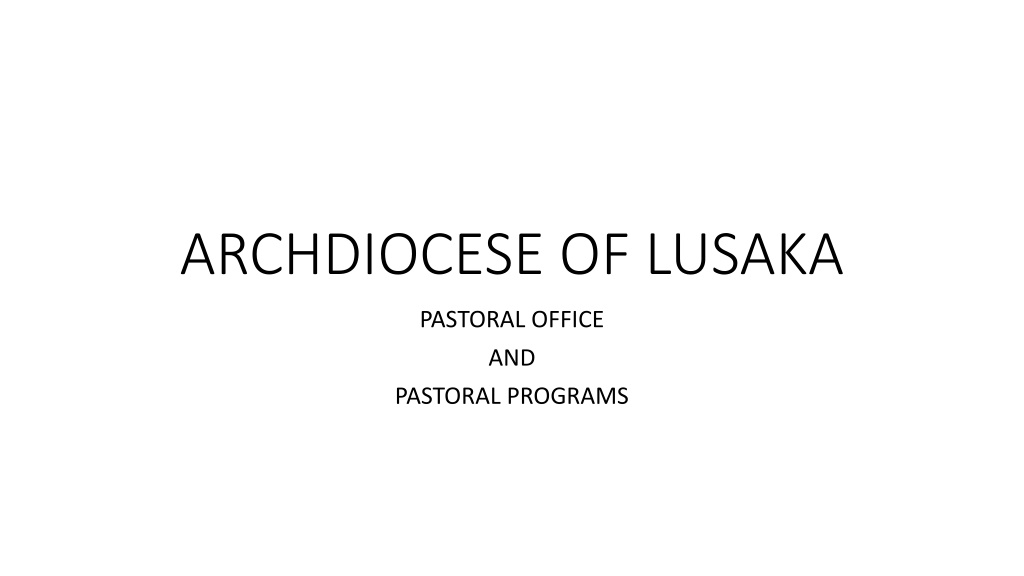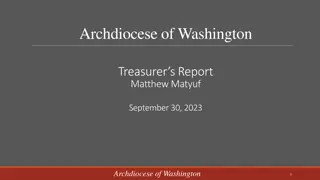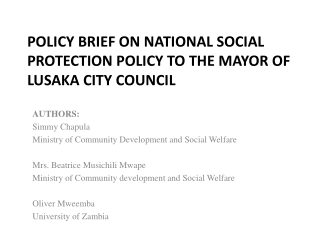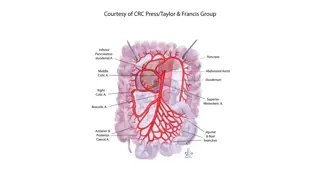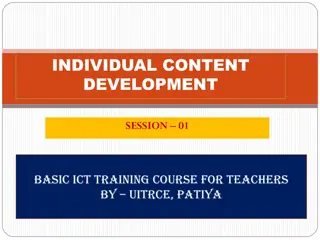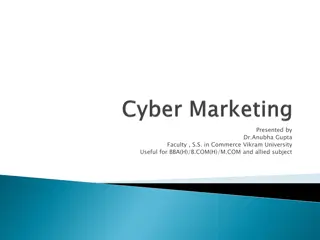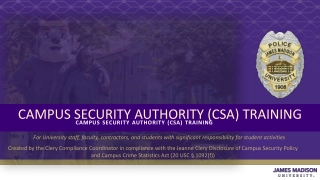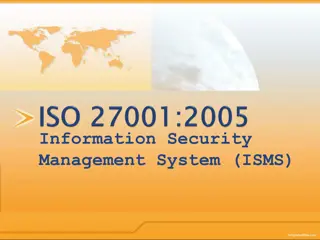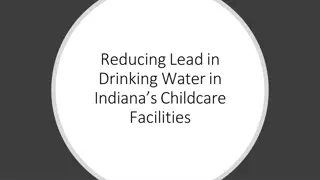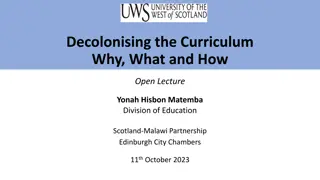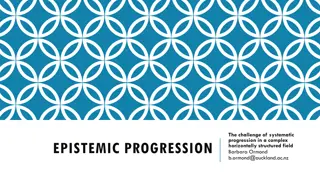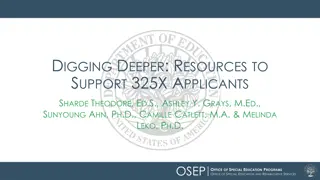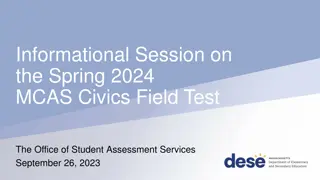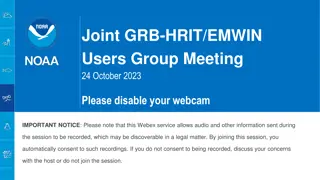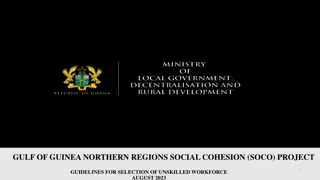Archdiocese of Lusaka Pastoral Guide: History, Purpose, and Content
The Archdiocese of Lusaka's pastoral guide, formulated through cooperation and guidance, serves to organize and systematize apostolic work within the church. It outlines the history, mission, and purpose of the Archdiocese, emphasizing unity, collaboration, and evangelization among clergy and laity. Continuous evaluation ensures its relevance amidst changing times and circumstances.
Download Presentation
Please find below an Image/Link to download the presentation.
The content on the website is provided AS IS for your information and personal use only. It may not be sold, licensed, or shared on other websites without obtaining consent from the author. Download presentation by click this link. If you encounter any issues during the download, it is possible that the publisher has removed the file from their server.
Presentation Transcript
ARCHDIOCESE OF LUSAKA PASTORAL OFFICE AND PASTORAL PROGRAMS
PREFACE PREFACE Our Divine Master and Saviour bequeathed to his Church the mandate to explain and teach all women and men the contained in the holy gospels, and to guide them to union with God. Guided inspiration of the apostles through the centuries, the Church has exercised her duty to teach and guide the people of God. everlasting truths as by the spirit and
FORMULATION OF THE GUIDE The Catholic Archdiocese of Lusaka (ADL) through the guidance and direction of cooperation of the Senior Management Team (SMT) and the Pastoral Guide Committee (PGC), has prepared pastoral norms, guidelines and procedures that will assist the clergy, members of the consecrated life, parish leaders and all the laity to offer service to the Church and participate fully in her life. These pastoral norms are called the Pastoral Guide of the Archdiocese of Lusaka. its Archbishop, with the
PURPOSE OF THE PASTORAL GUIDE The fundamental purpose of the Pastoral Guide is the well- ordered, organised and systematic apostolic work of all people in the Archdiocese. It will assist in defining who we are and what our role as Church in Lusaka is: The Church which goes forth in line with the mandate received through the apostles, (cf. Mt 28: 19). It will also help all pastoral agents to work in communion in the mission of evangelisation. Evangelii Gaudium, art., 24. direction of the
CONTENT AND DYNAMISM OF THE GUIDE CONTENT AND DYNAMISM OF THE GUIDE The Pastoral Guide contains laws and guidelines that oblige all the people both the clergy and laity of the Church in the Archdiocese of Lusaka. We recognise the fact that this Pastoral Guide will not be definitive and exhaustive but adequate for our coordination and collaboration in the service of God. It shall be subject to continuous revision and evaluation to respond to the changing times, circumscriptions. circumstances and
HISTORY AND MISSION OF THE ADL HISTORY AND MISSION OF THE ADL After three unsuccessful attempts from 1880 - 1883 to establish a mission in the Western Province of Zambia, Father Moreau and other Jesuit Fathers eventually managed to set up a mission station at Chikuni in Southern Province in 1905. In October 1905, Fr Julius Torrend, a French priest, started a mission station at Kasisi, in Lusaka Province. The whole of this territory administratively belonged to the Zambezi mission whose headquarters were in Salisbury (now Harare in Zimbabwe). In 1927 the whole southern part of Zambia was established as the Prefecture Apostolic of Broken Hill (now Kabwe) under Fr Bruno Wolnik, sj, as the Prefect Apostolic. It is from this, that in 1936 the Prefecture Apostolic of Livingstone was detached. Later in 1938, the Prefecture Apostolic of Ndola was also detached. In 1946 the headquarters of the Prefecture were transferred from Broken Hill to Lusaka, and its name changed to the Prefecture Apostolic of Lusaka.
THE BECOMING OF THE ADL THE BECOMING OF THE ADL In 1950 the Prefecture was raised to the status of the Vicariate Apostolic with FrAdam Kozlowiecki, SJ, as its VicarApostolic. On 25thApril 1959, the hierarchy was established in Zambia. The Vicariate Apostolic of Lusaka became the Archdiocese of Lusaka with the Vicar Apostolic Mons.Adam Kozlowiecki SJ becoming its firstArchbishop. The other partition of the territory of the archdiocese of Lusaka was effected in 1962 when the territory of the Southern Province, previously part of the Archdiocese of Lusaka was erected to a separate Diocese, called the Diocese of Monze. The last partition of the territory of the Archdiocese of Lusaka took place in 2011 when the Diocese of Kabwe was created.
ARCHBISHOPS OF LUSAKA ARCHBISHOPS OF LUSAKA 1959 to 1969 ArchbishopAdam Kozlowiecki SJ 1969 to 1982 Archbishop Emmanuel Milingo 1982 to 1984 Archbishop Elias Mutale of the Archdiocese of Kasama, was itsApostolicAdministrator. January 1984 to 15thMarch 1997,ArchbishopAdrian Mung andu, 15thMarch 1997 to 28thOctober 2006 Archbishop Medardo Mazombwe 28thOctober, 2006 to 18thApril 2018 Archbishop Teleshore G. Mpundu 18thApril 2018 to date ArchbishopAlick Banda
Mission, Vision and Core Values The Core Values The Archdiocese of Lusaka desires to promote: Solidarity Hard work Professionalism Love Peace Justice Fear of God Respect for cultural diversity, Respect for human life and dignity Mutual acceptance and trust to realize the vision. Self sustaining Self ministering Self propagating with equal opportunities and good stewardship. The Mission Statement To grow and bring all the people, ever closer to God through Holy Sacraments Integral Evangelization Spiritual Exercises Effective resource use The Vision A United Archdiocese, Owned by the Clergy, Religious and Laity, Founded on the Word of God which is celebrated in Liturgy and witnessed in Works of charity
SWOT ANALYSISI OF THE ARCHDIOCESE STRENGTHS Committed Clergy, Religious and Laity Well trained clergy, well versed in the social and political realities in the country Good network of parishes and institutions Management structures SCCs, Parish Councils, Deaneries, ADL Organisations (CMO, CWO, Youth) Social Programs (health, education WEAKNESS/CHALLENGES Apathy in on-going faith formation and prayers sessions Few priests and religious Harnessing of vocations Low church attendance by men and youth Lack of sabbaticals Lack proper contract
SWOT ANAYLSIS CONTED OPPORTUNITIES Repentance and conversion Liturgical seasons The Holy Mass Education Higher Institutions Public Health Land, other properties and assets Expansion of Lusaka Pool of Catholic professionals Cultural diversity Threats Heresies New churches (require ecumenism) Fundamentalism: inter-religious dialogue Disaffection among clergy and religious Poverty Street children as a time tomb Drug and alcohol abuse and addiction Child abuse scandals
FOCUS AREAS PASTORAL Liturgy and worship Sacraments Reconciliation and Healing Devotions Peace and Healing (counselling) Integral evangelization Catechism, catechetics, faith formation Vocations and formation SOCIAL Charity and Social justice Environment Entrepreneurship, innovation and community Incubation centres Health Education and Training
FOCUS CONTED COMMUICATIONS AND SOCIAL MEDIA Website Social media Facebook Telegram YouTube Twitter Radio Maria Lumen TV HUMAN AND RESOURCE MANAGEMENT Resource mobilization and Income generation activities Financial, Technical and other Partnerships Contracting UNITY AND OWNERSHIP
ARCHDIOCESAN PASTORAL COUNCIL (ADPC) ARCHDIOCESAN PASTORAL COUNCIL (ADPC) Description ADPC According to Canon 511 in each diocese, there is to be established a Pastoral Council if pastoral circumstances permit. A Diocesan Pastoral Council is a consultative organ instituted under the authority of the Bishop to investigate, study pastoral matters and propose practical ways of implementing them. Here, the Archdiocesan Pastoral Council meets at least once a year (cf. Can. 514). It is convened and presided over by the Local ordinary.
Functions of the Archdiocesan Pastoral Council (ADPC) The Archdiocesan Pastoral Council accomplishes its purpose in pastoral functions by considering the following: To promote the mission, vision, pastoral principles and values of the Archdiocese among the People of God; To build up a sense of trust and unity among all the people in the Archdiocese; To evaluate Archdiocesan pastoral plans and activities and proposing better ways of implementing them; To make recommendations to the Local Ordinary on pertinent pastoral matters and priorities as prayed, discerned and discussed at the annual meeting. It is an advisory council, (cf. Can. 514).
Membership of the Archdiocesan Pastoral Council Membership of the Archdiocesan Pastoral Council The Chairman The Secretary Programs Deans Vocations Promoter Director for Finance Director for Social Programs On Going Formation Manager Archdiocesan Youth Chaplain Biblical Manager The Local ordinary Director for Pastoral Deanery Pastoral Council Secretary A representative of the Religious and the Consecrated Archdiocesan Catholic Women Organization (ACWO) Chairlady Archdiocesan Catholic Men Organization (ACMO) Chairman Archdiocesan Catholic Youth Organization (ACYO) Chairperson Archdiocesan Holy Childhood Coordinator Any other members the Local Ordinary may want to co-opt. PMS Director Catechetical Manager Liturgical Manager
DEANERY/DEAN The Dean is an Archpriest appointed by the Local Ordinary after consultation with the priests who are exercising their ministry in the same Deanery. He does not need to be a Parish Priest but must have some parish pastoral experience. The executive committee shall consist of the Dean, Secretary and Vice Secretary (who shall serve as Treasurer as well). The term of office of the Dean shall be determined by the Local Ordinary. The functions of the Dean are closely connected to the office of the Local Ordinary. He is a representative or delegate of the Bishop in that part of the Diocese. His proper functions are clearly stipulated in the Code of Canon Law (cf. Can. 555).
SOME FUNCTIONS OF THE DEAN To promote and coordinate common pastoral activity within the Deanery, (cf. Can. 555 1, 1 ); To ensure that the clerics of his Deanery are leading a life befitting their state, and discharge their functions diligently, (cf. Can. 555 1, 2 ); To assist in the on-going pastoral and spiritual formation of the priests by attending and participating in the various seminars and retreats provided for that purpose (cf. Can. 555 2, 1 ); To ensure that a priest who finds himself in difficulties; material, emotional, spiritual or otherwise, receives adequate and timely assistance, (cf. Can. 555 2, 2 ); To ensure that all religious functions and celebrations adhere to the established Church norms, (cf. Can. 555 1, 3 )); To ensure that all Parish books, registers, documents are properly managed; not lost or removed (cf. Can. 555 3); To ensure that priests in his Deanery who are sick, or elderly are cared for in collaboration with the Local Ordinary, (cf. Can. 555 3);
SOME FUNCTIONS OF THE DEAN To promote and coordinate common pastoral activity within the Deanery, (cf. Can. 555 1, 1 ); To ensure that the clerics of his Deanery are leading a life befitting their state, and discharge their functions diligently, (cf. Can. 555 1, 2 ); To assist in the on-going pastoral and spiritual formation of the priests by attending and participating in the various seminars and retreats provided for that purpose (cf. Can. 555 2, 1 ); To ensure that a priest who finds himself in difficulties; material, emotional, spiritual or otherwise, receives adequate and timely assistance, (cf. Can. 555 2, 2 ); To ensure that all religious functions and celebrations adhere to the established Church norms, (cf. Can. 555 1, 3 )); To ensure that all Parish books, registers, documents are properly managed; not lost or removed (cf. Can. 555 3); To ensure that priests in his Deanery who are sick, or elderly are cared for in collaboration with the Local Ordinary, (cf. Can. 555 3);
FUNCTIONS OF A DEAN To ensure that the pastoral policy of the Archdiocese is being carried out, among others, (cf. Can. 555 1& 4); To facilitate the creation of new Parishes in collaboration with priests in the Deanery and Local Ordinary. To ensure that the Parish Rectories and Parish buildings are furnished and well maintained, (Can. 555 1, 3 ).To convene and Chair Deanery Priests and Pastoral Council Meetings, though he may delegate the actual moderation of meetings. To ensure that there is proper leadership in all Lay groups, Movements, Associations, Councils and Committees in the Deanery.
Composition of the Deanery Pastoral Council (DPC) The Dean and Deanery Clergy Chaplains of Institutions in the Deanery Parish Pastoral Council Chairpersons, Secretaries and Treasurers Deanery Catholic Men s Organization (DCMO) Chairman Deanery Catholic Women s Organization (DCWO) Chairlady Deanery Youth Council Chairperson Deanery Holy Childhood Coordinator Deanery Pastoral Sisters Deanery Liturgical Committee Chairperson Deanery Catechetical Committee Chairperson Deanery Biblical Apostolate Chairperson And any other invited/included by the Dean
Functions of the Deanery Pastoral Council (DPC) To work together to implement pastoral programs and activities of the Archdiocese; To run initial training and ongoing formation for various pastoral ministries in the Deanery To help the Pastoral Office in harmonizing all pastoral programs and activities.
PARISH Parish is understood as a certain community of the Christian faithful stably constituted in a particular Church, whose pastoral care under the authority of the Diocesan Bishop, is entrusted to a Parish Priest as its pastor, (Can. 515 1). The Parish is established, suppressed or altered by the diocesan Bishop alone AFTER consultation with the Presbyteral Council, or the Council of Priests (cf. Can. 515 2). In certain instances, the Parish Priest may be assisted by another priest in carrying out parish ministry.
ESTABLISHMENT OF NEW PARISH That special pastoral needs demand that there be such an undertaking; That there is adequate infrastructure and resources to assist in the effective and efficient pastoral ministry delivery such as Church, Parish house, transport, land; That there is a community of Christians large enough that needs to be served by way of Parish.
PARISH PRIEST The Parish Priest as a proper Pastor exercises pastoral care in the given parish under the authority of the diocesan Bishop in whose ministry of Christ he has been called to participate. Here, the Pastor is not only and simply the delegate of the diocesan Bishop but one who functions with ordinary power as given in law by reason of the office he has received, (cf. Can. 519.) He must be outstanding in sound doctrine and integrity of morals, endowed with zeal for the people of God and exhibiting virtues and other qualities required by the ecclesiastical law (cf. Can. 521 2).
DUTIES OF THE PARISH PRIEST The Parish Priest s functions extend to all the people of God in the given Parish without discrimination. Among many functions of a Parish Priest are: To celebrate sacraments; To conduct funerals (cf. Can. 530, 5 ); To give solemn blessings (cf. Can. 530, 3 ); To govern the People of God entrusted to his care in the spirit of the gospel; To ensure that evangelization, through the preaching of the Word of God and catechesis, is done in the Parish; To ensure that the Christian Community under his care is instructed carefully in the truths of the Catholic faith through preaching and catechetical instructions; To promote devotion to the Blessed Sacrament and to the Blessed Virgin Mary on days carefully selected;
PP DUTIES CONTED The Parish Priest is required to administer baptism, confirmation (in danger of death), hear confessions, administer viaticum and the anointing of the sick. He is also required to assist at marriages and celebrate the Eucharist on Sundays and holydays of obligation, (cf. Can. 530). To strive to serve as a Pastor of all people by carrying out pastoral visitation of families and communities To ensure that there is special care of Catholic education for the Christian children and young people in the parish; To ensure the safe keeping of all parish documents; To take inventory of the parish property every year together with the Parish To ensure proper handover of all parish property and financial accounts when transferred. Some of the documents that need to be presented during the handover are the following: Registers of; Baptism, Confirmation, Marriage, First Holy Communion, Marriage Certificate Books, and register for the dead. Updated Inventory, approved structural Plans, All Insurance Policies existing, Contracts for all workers, Parish Financial Accounts, Bank statements and Cheque- Books, Photo copies of the Title Deeds of the Church, houses owned by the Parish and other Land Documents, Notification of Sacraments, Date Stamps, Register for Marriage Banns, Government Correspondence File, and all Correspondence.
ASISTANT PARISH PRIEST The Assistant Priest is a close collaborator of the Parish Priest in the pastoral administration of the Parish. His rights and obligations are regulated and guided by the specific assignments from the Local Ordinary, (cf. Cann. 541 552). Whenever it is necessary or opportune in order to carry out the pastoral care of a Parish fittingly, one or more parochial vicars can be associated with the pastor. As co workers with the pastor and sharers in his solicitude, they are to offer service in the pastoral ministry by common counsel and effort with the Pastor and under his authority, (Can. 545 1). Assistant Priest or Parochial Vicar shares in the threefold ministry of teaching, sanctifying and governing although there are distinctions between them. Certain sacramental and liturgical functions are reserved to the Parish Priest. The Assistant Priest needs the pastor s agreement to celebrate baptisms, marriages, anointing of the sick and to conduct funerals. Only the pastor represents the parish in juridical affairs (cf. Can. 532). The Assistant Priest is obliged to attend all Parish Pastoral Council Executive and Parish Pastoral Council general meetings.
PARISH PASTORAL COUNCIL (PPC) The Parish Pastoral Council is to be established in each Parish over which the Pastor presides and in which the Christian faithful, together with those who share in pastoral care by virtue of their office in the parish, assist in fostering pastoral activity, (Can. 536 1). The Parish Pastoral Council possesses consultative vote only and is governed by the statutes that are established by the Bishop, (Can. 536 2). The Parish Priest is the final authority of the Parish Pastoral Council. All decisions can only be effected if made or ratified by him. Through the Parish Pastoral Council, active collaboration between the Parish Priest, and the Community in fostering the spiritual, social and material development of the parish takes place. The Parish Pastoral Council with the Parish Priest, and never without him, is to be the supreme organ through which the parish reflects upon, initiates and co-ordinates activities aimed at the building up of the Church in the Archdiocese. The Parish Pastoral Council members shall always strive to bring the mind of Christ, who came to serve and not to be served, to their ministry and avoid temptation of confusing service to Christ and the Church with a desire for personal power and prestige
COMPOSITION OF THE PARISH PASTORAL COUNCIL (PPC) The Parish Priest Assistant Priest Religious Sister working in the Parish Elected representatives of Sub parishes/Outstations, (where there are Outstations/Sub Parishes), or SCCs Chairpersons of Parish Lay Organizations/Movements Chairpersons of Councils (Catholic Men s Organization, Catholic Women s Organization and Catholic Youths Organization) Chairpersons of Committees of the Parish One Representative from the Parish Holy Childhood Animators Full time Catechists (if any)
FUNCTIONS OF THE PARISH PASTORAL COUNCIL To assist the Parish Priest in the mission of evangelization and administration of the Parish To promote spiritual growth and integral human development thereby instilling a sense of dignity and purpose in the People of God within the parish; To co-ordinate the activities of Small Christian Communities (SCCs), Church Councils, Other Councils, Committees and lay organizations; To disseminate information and implement programs coming from the Deanery and the Archdiocesan levels in the Parish; To plan and implement Parish Pastoral programs; To approve the proposed annual Parish budget; Operations of the Parish Pastoral Council A quorum consists of 50% plus one of the Council s total Membership The meetings must be held at least quarterly. Because of the importance placed on pastoral planning, a new Parish Priest or Administrator should call for the Parish Pastoral Council within a month of taking up his appointment.
NATURE OF THE PARISH PASTORAL COUNCIL EXECUTIVE (PPCE) Parish Pastoral Council Executive is elected from the members of the Parish Pastoral Council (PPC). It is elected for the term of three years but eligible for another Term. It shall meet at least twice a month. Parish Pastoral Council Executive Members shall have the following qualities Must be Catholics, communicant and living according to Church teaching. Must be willing to serve the Church Must be willing to promote unity in the Church Must have regular payment of Mtulo/tithe Must have minimum age of twenty one (21 years).
FUNCTIONS OF THE PARISH PASTORAL COUNCIL EXECUTIVE (PPCE) FUNCTIONS OF THE PARISH PASTORAL COUNCIL EXECUTIVE (PPCE) To coordinate all activities of the Parish. To plan and organize resources needed to attain the objectives of the Parish. To represent the Parish at various levels i.e. at Deanery and Archdiocesan levels To ensure that all committees, councils and groups are on right and forecast to meet their objectives. To ensure that all executive positions are functional and coordinates them accordingly. To promote unity, team work and create an environment which is conductive for members to participate in the life and the mission organization and feels a sense of ownership. To plan and prepare for PPC meetings in advance in collaboration with the Parish Priest. To keep records pertaining to the Parish, Deanery and Archdiocese.
FUNCTIONS OF CHAIRPERSON To lead the meetings of the Parish Pastoral Council To coordinate all activities of the Parish To plan, organize methods and resources needed to attain the objectives of the Parish To ensure that all executive positions are functional and coordinates them accordingly To ensure that all committees and councils function to meet the objective of the Parish To promote unity, team work and create an environment which is conducive for members to participate in the life and the mission organization and feels a sense of ownership To represent the Parish at various levels To Prepare for meetings in advance in collaboration with the Parish Priest
SECRETARY To notify the members of the PPCE and PPC of the date and time of meetings To organize items to be discussed and to present them to the Parish Priest To write reports and present at the beginning of the following meeting To administer the Secretarial matters of the parish Keep records pertaining to the Parish and outside i.e. Deanery and Archdiocese To prepare and provide the members with minutes of meetings
TREASURER To keep records of Parish property and accounts To prepare and present the budget for the Parish To be responsible for preparing financial reports and maintaining books of accounts. They should be presented at meetings when requested To be responsible for collecting all monies and to arrange that receipts are issued for all monies received To ensure that there is transparency and accountability in all matters pertaining to Parish fund To organize formation programs on self-reliance for members of the Parish To remind the Parish members their financial obligations
LITURGICAL COMMITTEE LITURGICAL COMMITTEE It is a committee of the Parish Pastoral Council. The Liturgical Committee shall, in collaboration with the Parish Priest, carry out certain responsibilities such as: To encourage the faithful to be in full, active and conscious participation in the liturgy, para- liturgy and other communal prayer forms; To promote authentic Catholic Sacred Music; To be aware of the liturgical needs of the parish community; To oversee the Parish liturgical life, training and formation, of its members and choirs; To ensure the right use of liturgical books, vestments and sacred vessels; To answer to the needs and queries of the Parish Council concerning the liturgical matters in the Parish; To assist the Parish Priest in the smooth running of each ceremony. They will act as coordinators between the different groups working for the liturgy; Choirs, Altar Servers, Lectors, and Ushers. To promote better understanding of the liturgy in the Parish. To liaise with the Archdiocesan and Deanery Liturgical Committees
MEMBERS OF THE COMMITTEE Being a working committee, the members ought to possess some necessary skills in order to fulfill their tasks. Being a working committee, its members should not be elected but rather chosen for their abilities. The PPC proposes the names of the committee members that may be confirmed by the Parish Priest and the Parish Pastoral Council Executive after careful scrutiny. Committee members shall elect among themselves their office bearers namely Chairperson, Vice Chairperson, Secretary, Vice Secretary. The Chairperson would be an ex-officio member of the Parish Pastoral Council. Once elected and trained for their tasks, it will not be necessary to change all the members, unless otherwise, whenever there is a new Parish Pastoral Council. However, the executive of the committee will have elections for new office bearers facilitated by the new Parish Pastoral Council Executive every three years.
PARISH CATECHETICAL COMMITTEE It is a committee of the Parish Pastoral Council. The Catechetical Committee is a team of men and women from among the faithful who voluntarily take up the responsibility of preaching and teaching others the word of God under the command of the Lord: Go and teach all nations, (Mt. 28: 18 20). It is a committee of the Parish Pastoral Council. The members of the Catechetical Committee are all catechists or catechizers in the Parish. If there is a Catechist in the Parish, he/she is an ex-officio member of the Parish Catechetical Committee Executive. There shall be an executive committee elected from among the catechizers every three years facilitated by the new Parish Pastoral Council Exectuive. There shall be four members of the executive committee: The Chairperson, Vice Chairperson, Secretary and the vice secretary. The Chairperson shall sit on the Parish Pastoral Council. The Catechetical Committee shall, in collaboration with the Parish Priest, carry out certain responsibilities such as: To give catechetical instructions in the Parish, except those of marriage, leading to the reception of sacraments; To Prepare for the celebration of Sacraments of the candidates in conjunction with the Parish Liturgical Committee; Assist and advise the Parish Priest on matters pertaining to the Catechetical instructions.
BIBLICAL APOSTOLATE COMMITTEE It is a committee of the Parish Pastoral Council. The Biblical Apostolate Committee shall, in collaboration with the Parish Priest, carry out certain responsibilities such as: To make the Bible accessible to the faithful; To encourage the publication and distribution of Bible aids (booklets, audio-visuals, and others instruments); To encourage Biblical Seminars, reflections and study among the faithful in Parishes, SCCs, and families; To encourage the faithful to read the Bible comprehensively, systematicallyand continuously, according to the teaching of the Catholic Church. There shall be an executive committee elected from among the catechizers every three years facilitated by the new Parish Pastoral Council Executive. There shall be four members of the executive committee: The Chairperson, Vice Chairperson, Secretary and the vice secretary. The Chairperson shall sit on the Parish Pastoral Council.
OTHER FUNCTIONS OF THE BIBLICAL COMMITTEE To provide the Catholic faithful with the basic and correct understanding of the Bible; To enlighten the Catholic faithful on the authenticity of the Catholic faith based on the Bible and Tradition; To make the Catholic faithful aware of the science and Christian apologetics; To promote dialogue between faith and culture in the light of the Sacred Scriptures; To assist the Catholic faithful, appreciate the need to read Bible in their daily lives; To teach the Catholic faithful methods of praying with the Scriptures; To enlighten the faithful on Church documents on the Bible; To ensure that the Bible is at the centre of the life of the Church.
SMALL CHRISTIAN COMMUNITIES (SCCs SMALL CHRISTIAN COMMUNITIES (SCCs There is a pastoral practice of Small Christian Communities (SCCs) in the Catholic Church in Africa. Every Parish is encouraged to form SCCs as a way of being Church. This is to be a pastoral priority in the Parish. Small Christian Communities are an effective way of developing the mission dimension of the Church at the most local level and of making people feel that they are really part of the Church s evangelising work. Small Christian Communities are a Church called to become self-sustaining, self propagating and self-ministering. Small Christian Communities are not programs or projects but a way of life. There has never been a single but a variety of descriptions of a SCC. Some have described a SCC as a Church in the neighbourhood , or a parish based pastoral model of the Church that transforms the parish into a communion of communities and an instrument of evangelisation. The Baptismal unity is best expressed in the SCC as the Word of God is read, the Eucharist shared, prayers offered, and the poor taken care of. Here, daily life is shared.
PURPOSE OF SCC To deepen the faith of all the People of God in the Parish. To help Christians become more responsible for their faith; to know and help one another both spiritually and materially. To eliminate all forms of individualism, selfishness and self-centredness by promoting unity of all the People of the God.
DUTIES OF THE LEADERS OF SCCS To organize and build the community into a family of God. To encourage all the members of the SCC to put into practice the evangelical values as espoused by Christ and the Church. To serve as representatives at the Parish Pastoral Council meetings and as a link with the Parish Priest. To encourage members to be witnesses in the society General Procedure for Meetings It is expected that SCCs meet at least twice a month and meetings should last for one and half hours only. One meeting can be dedicated to the Word of God and another to business matters of the Community. These meetings are to be held in homes on rotational basis. The aged and the sick who cannot attend can be visited thereafter or on any day appropriate.
THE FOUR CARDINAL ASPECTS OF THE SCC: Prayer Word of God Eucharist Charity
SACRAMENTS Baptism Infant baptism Adult baptism Conditional baptism Confirmations Eucharist Penance/Reconciliation Anointing of the Sick Marriage Priesthood
